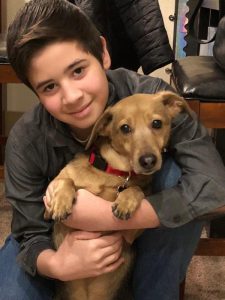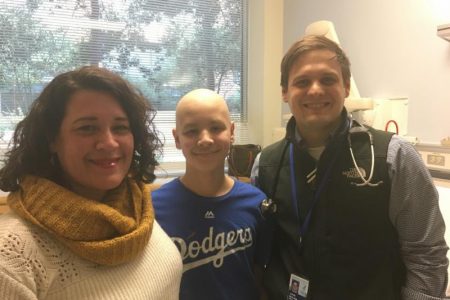Jackson, a Portland, Oregon teen-ager, was suffering from a rare genetic disease before it even had a name. He was just two when his mother first noticed his symptoms, swelling in his legs. Later, he also experienced hearing loss and a severe vulnerability to infections. It would be years before the genetic testing needed to identify his illness was available.
Jackson has GATA2 deficiency, which was discovered in 2011. GATA2 is a gene that makes a protein that helps regulate blood cell production in the bone marrow. But when the gene carries a mutation that leads to GATA2 deficiency, the result can be a variety of symptoms like those seen in blood cancers. The most promising treatment is a bone marrow transplant. Jackson was referred to the NIH this past February to evaluate that option. “For me, it wasn’t a matter of if I needed a transplant, but simply when,” he said.
An exceptionally articulate 14-year-old, Jackson discusses the origin of his disease and the treatment protocol with a maturity far beyond his years. It may help that his mother, Julia, is a nurse and has been his advocate and caregiver every step of the way.
Jackson underwent the bone marrow transplant on August 28th at the NIH Clinical Center. Doctors were concerned that finding a donor would be difficult because Jackson is biracial. But fortunately, the donor registry identified a perfect match – a 20-year-old young man from the Netherlands.
The transplant has been a challenge. “It’s been rough. It was definitely like they said it would be, worse before he was better,” Julia added. “I found that I had sympathetic symptoms. When he was nauseous, I was nauseous. Not surprisingly, when he was exhausted, we both were.”

Jackson, 14, and his dog, Buster
(pre-treatment)
Being at the NIH for 100 days of post-transplant monitoring also has been a challenge.
Jackson and Julia moved out of their Portland apartment and put their belongings in storage before heading to the NIH. Initially they stayed at the Children’s Inn. When the Inn had to evacuate families due to structural problems, Friends at NIH stepped in to place the family in a nearby apartment. “It is so close to the hospital and absolutely beautiful. It felt like a resort,” Julia says. “Because it is a private family residence, Jackson could get a day pass out of the hospital which helped boost his spirits. Thank you, Friends.”
Julia says doctors report that Jackson is recovering well – ahead of the healing curve,
in fact, with 83% to 100% of his cells now coming from the donor cells. Meanwhile, he is looking forward to returning to Portland to his pet bird, Lily, and his dog Buster, before Christmas and returning to school in the new year. And Julia and Jackson have a message for the Friends at NIH family: “A big thank you to the donors who make all of this possible. It was a blessing to have a true home away from home at the apartment.”





